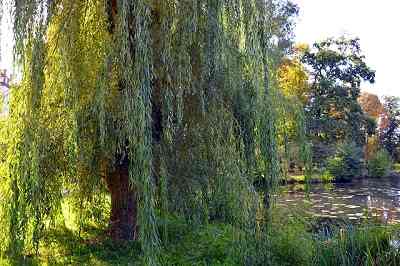If you are searching for willow tree spiritual meaning then before that let me tell you they are one of the strongest and long running trees once planted in an open area. In this blog I will discuss the willow tree, its spiritual meaning, associations and myths. Let’s start this by answering your question:
What is the spiritual meaning of willow?
The Willow tree symbolizes growth, strength, Good luck, fertility, deep emotions, spiritual awakening, new beginning of life, expansion, stability and security. Native Americans always associated this tree with various things because of its shape, power and how it protects the boats from surprisingly harsh weather.
What is a Willow Tree?
A Willow Tree is a special tree that belongs to the Salicaceae family and is native to North American, South of Mexico and China. They are fast growing, large trees with long branches that help people to tie their boats so the bad weather won’t spoil the boat. The tree can be grown up to 60 to 80 feet and they are in Salix genus. Most importantly the willow tree has over 90 species and is grown very easily because even if the branches are planted in the ground they start to grow a new tree of their own.
The leaves and bark are useful for medicinal purposes to make a herbal tea and According to wiki, they have a total of 350 species that includes the hybrid ones as well.
Willow Tree Spiritual Meaning
The Willow tree symbolizes growth, strength, Good luck, fertility, deep emotions, spiritual awakening, new beginning of life, expansion, stability and security. Native Americans always associated this tree with various things because of its shape, power and how it protects the boats from surprisingly harsh weather.
Strength
Willow is associated with Strength due to its ability to withstand harsh climate and also they are one of the longest growing trees on earth. They have powerful trunks with long branches that will not easily break that makes it a more robust and helpful tree.
Good Luck
Native Americans mostly associated willow trees with good luck because they were there to protect the boats and remanings of people when there was a bad storm. Many people create their homes near the willow tree so that it avoids any bad things from happening and also the willow tree is powerful, intact in the ground which helps the ancient people to overcome their fear about natural disaster and which gives them hope that leads to positive and good luck.
Fertility
The trees are popular with their long and stretched branches that are associated with fertility because once any of the branches goes into the ground they can easily develop a new tree from the existing ones.
Deep Emotions
Native Americans are so much connected to the willow tree that they have built their houses near the tree so that they do not fear harsh storms and bad events.
Spiritual Awakening
Many people believe that willow trees are linked with spiritual awakening and a positive mindset. The trees revive people’s spirit and this creates a strong connection to the tree.
New Begining of Life
Life begins whenever the branches of a willow tree enter the soil and get water. They build more new branches and with that it has the ability to create more willow trees. This proves that they are associated with a new beginning of life.
Expansion
The willow tree is associated with expansion because they have long branches that help people and also that helps nature to build more such trees in the forest. The branches expand and keep on growing for 50-80 years and very few pests infest the willow trees.
Stability
The willow tree symbolizes stability since it can resist difficult circumstances. The willow tree’s long, flexible branches bow toward the earth, symbolizing humility.
Willow trees have weeping branches. Weeping trees grow in marshes. The willow tree’s trunk’s connection to the earth allows its limbs to bend and droop.
Security
I’ve always appreciated the willow tree’s mystical nature. Because of its longevity, this tree symbolizes security. I adore how its branches extend far into the sky despite its little height. It is a tree found in many civilizations and utilized for numerous reasons.
What is the myth behind the weeping willow?
Weeping willows have been used as symbols of mourning and death for a very long time in both literature and art. This is largely because of a myth from ancient Greece about Alexander the Great. The story says that Alexander was in a boat when a willow brushed his crown off his head. The oracles in his court took this as a bad omen and foretold that he would die soon after. We have heard the tale of Alexander the Great and the weeping willow for many years, and it has remained ingrained in our collective memory.
Beyond its association with loss and grief, the weeping willow has deeper symbolic meanings. A metaphor for sadness and hopelessness is represented by the willow tree’s drooping branches. The weeping willow frequently serves as a literary allegory for sadness, mourning, and loss. As a result of the willow’s ability to bend and sway with the wind while remaining standing, it is also regarded as a symbol of resiliency and hope.
A potent representation of both death and life, the weeping willow is a powerful image. It serves as a reminder of both our mortality and our capacity for resiliency and grief management. The story of Alexander the Great and the weeping willow serves as a reminder to us to respect our grief and to persevere in the face of adversity.
Willows have inspired numerous cultures for millennia. The willow tree is the home of the Japanese moon goddess and a symbol of calm and grace. Willows represent Brigid, wisdom, intuition, and healing in Celtic iconography.
The Chinese willow tree symbolizes immortality and longevity. The Chinese believed that the willow could bring life back from the dead, and this concept was even reinforced by some of the works of Confucius. In some Chinese societies, the willow tree is also associated with love and luck.
Due of its adaptability, the willow tree is praised. It is also recognized for its flexibility, since it can bend without breaking, making it a sign of adaptability and perseverance.
The graceful willow tree is admired everywhere. Its drooping branches and rich foliage are appreciated, and its myriad meanings and stories make it a potent emblem in many cultures. The willow tree can bring you luck, calm, or healing.
What are the healing properties of willow?
For millennia, white willow bark has relieved pain and inflammation. Recent research have shown that the bark contains salicin, a molecule comparable to aspirin, which gives the herb great therapeutic effects (acetylsalicylic acid). The bark’s medicinal properties are attributed to salicin and powerful flavonoids.
White willow bark reduces inflammation, discomfort, and treats many conditions. Though it can be used physically, it is usually consumed as a tea, pill, or tincture. White willow bark can interfere with drugs, so consult a doctor before using it.
White willow bark may relieve headaches, muscle discomfort, and arthritis. Its anti-inflammatory and pain-relieving qualities address many types of pain. Its natural elements also assist you avoid traditional pain medication adverse effects.
Recent research shows that white willow bark is a beneficial skin care element as well as a therapeutic one. Antioxidants in the bark diminish wrinkles and age spots, according to research.
Antioxidants boost skin blood flow, nourishing it. This maintains healthy skin and slows aging. Antioxidants reduce inflammation and protect the skin from sun and pollution damage.
Antioxidant-rich white willow bark can be eaten or applied topically. A cream or lotion with bark helps absorb antioxidants when applied topically. Before taking supplements, ask a doctor.
White Willow bark has many skin benefits. Its antioxidants decrease wrinkles and age spots and protect against environmental harm. White Willow bark is a natural way to maintain youthful skin.
What does the Bible say about a willow tree?
The Bible’s willow tree symbolism is potent. It symbolizes homelessness and hope, as referenced in Psalm 137. This poem shows the Jews in Babylon remembering their homeland and hoping to return.
The willow tree is used to identify graves and memorialize tragedies, symbolizing sadness. The Jews in Babylon hoped to come home one day, even though they couldn’t. In this lyric, the willow tree symbolizes their lost homeland and the desire of returning to it.
The willow tree represents resilience. It thrives despite its anguish. Exiled Jews in Babylon held out hope of returning home. In this phrase, the willow tree symbolizes their hope and persistence.
The Bible’s willow tree symbolism evokes grief, hope, and survival. It teaches us that we may find hope and be resilient even in the darkest moments.
Are willows mentioned in the Bible?
Biblical willow trees are potent symbols. It depicts the Jews’ exile to Babylon and their dream of returning home in Psalms. “There on the willow trees, we hung up our harps” expresses this wish. The willow tree symbolized the people’s anguish and hope that their exile would cease.
Willow trees symbolize optimism, faith, and persistence. It offers us hope that we can keep our faith and trust God even in the hardest situations. The willow tree’s symbolism and message of hope should encourage us as we consult the Bible.
What does willow mean in Native American?
Traditional and modern medicine have used willows. Salicin, the active element in aspirin, is found in willow bark. It treats fever, discomfort, diarrhea, and asthma.
Willows are thought to heal spiritually and emotionally. Willows represent knowledge, openness, and strength in Native American civilizations. They bring comfort, safety, and clarity to stressful situations.
Over 400 species of willows—also called “sallows” or “osiers”—exist. The majestic Weeping Willow and thin Crack Willow are found worldwide.
What is the willow tree known for?
Gardeners and landscapers love willow trees for their various applications and advantages. They are decorative, shade-giving, and erosion-controlling. Willows have also been utilized for millennia to build.
Willows may also heal. Salicin, present in several painkillers, comes from willows. Anti-inflammatory and analgesic, it’s been used for ages.
When designing a landscape project, consider the willow tree’s numerous advantages. It provides shade, beauty, and natural healing!
What do willow trees attract?
During the late summer months, you may notice that willow trees have become magnets for wasps, bees, flies and other insects. While it can be concerning or annoying to have these pests around, understanding why they’re attracted to the willow trees can provide some insight and relief.
It turns out that these insects are most likely attracted to honeydew deposits from sap-feeding insects, such as aphids. These insects, also known as plant lice, feed on plant sap, which excretes a substance called honeydew. This sticky, sugary substance is like a magnet for other insects, like wasps and bees.
In addition to these predators, the honeydew deposits also attract other insects, such as flies, that feed on the honeydew itself. Because these insects are attracted to the sugary substance, they are also attracted to the willow trees, where the aphids are likely to congregate.
As annoying as it may be to have these insects around, they are actually beneficial to the environment by helping to control the population of sap-feeding insects, like aphids. So while it can be a nuisance to have wasps, bees and flies around your willow trees in the late summer, understanding the reason why they’re there can provide some perspective.
Final Thoughts
I hope you like this article on “What is the spiritual meaning of willow?”, ” willow tree spiritual meaning” and various other important things related to it.


